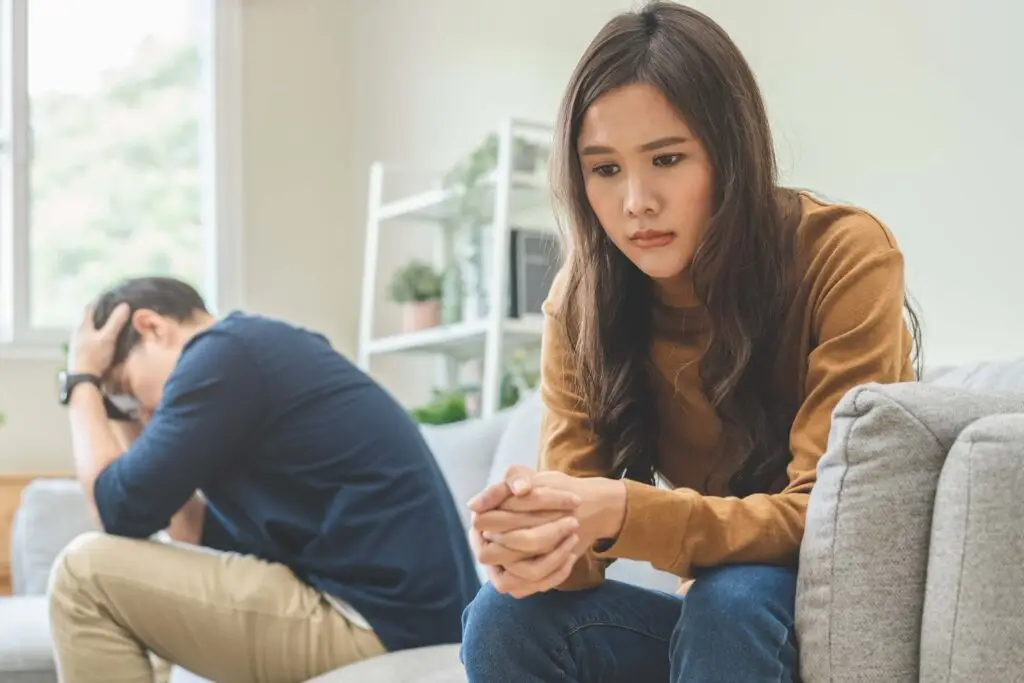Conflict can feel uncomfortable. Maybe your stomach churns, your chest tightens, or your mind races when something needs to be said, and it feels too risky to say. You might shut down or change the subject.
This is conflict avoidance, and it’s more common than you might think, especially in close relationships.
While avoiding conflict may feel like the safest route, it can silently erode emotional closeness, block honest communication, and leave both you and your partner feeling misunderstood.
Let’s unpack what conflict avoidance really is, why it happens, how it affects your relationship and mental health, and how to learn healthier ways to cope and connect.
What is conflict avoidance?
Conflict avoidance is the act of withdrawing from or dodging confrontation. You might smile and nod, change the subject, stay silent, or agree to something that doesn’t feel right just to avoid upsetting your partner.
Conflict avoidance can look like:
- saying “it’s fine” when it isn’t
- apologizing just to end the conversation
- becoming passive-aggressive instead of speaking openly
- withdrawing emotionally or physically
While it can seem like you’re keeping the peace, conflict-avoidant patterns often create deeper distance.

Why do you avoid conflict?
The desire to avoid conflict often stems from fear. That fear may come from past experiences, learned behaviors, or your beliefs about relationships.
Some common reasons why you may avoid conflict include:
- fear of rejection, abandonment, or being judged
- fear of intense emotions (yours or your partner’s)
- growing up in an environment where confrontation led to yelling, criticism, or silence
- believing that conflict is a sign of an unhealthy relationship
These responses likely serve to protect yourself from unhealthy situations or emotional pain. You’ve likely learned to avoid conflict to stay emotionally safe.
The psychology behind conflict avoidance
There are several explanations for how conflict brings up your fears.
1. Approach-avoidance conflict
Although you may want to speak up, you fear what will happen if you do. This internal tug-of-war is known as approach-avoidance conflict. It creates anxiety because you’re pulled in both directions.
Example: You want to ask your partner to spend more time together. You also worry they’ll feel smothered if you ask. So you stay quiet, hoping the issue will resolve itself.
2. Fear of negative evaluation
This theory explains that you might avoid interpersonal conflict because you fear being seen in a negative light. You may imagine being criticized, misunderstood, or losing love and connection.
Example: You don’t share what’s bothering you because you’re afraid your partner will think you’re “too sensitive” or “needy.”

How conflict avoidance harms relationships
Avoiding confrontation might feel easier at the moment, but it often leads to long-term tension, especially in relationships where emotional intimacy is important.
Here’s how conflict avoidance can harm both your connection and your mental health:
1. It builds resentment.
When needs go unspoken, they grow into bigger unmet needs. Resentment and frustration build under the surface, and the relationship starts to feel strained.
2. It reduces emotional and physical intimacy.
When you’re avoiding real conversations, it’s harder to feel close. That emotional distance can show up physically, too, reducing intimacy and touch.
3. It creates assumptions.
Without open communication, assumptions take over. You may start believing your partner doesn’t care, or they may feel confused about your behavior.
4. It increases anxiety and stress.
Suppressing your thoughts and emotions takes a toll on your mental health. Research shows that emotional suppression can contribute to chronic stress, anxiety, and symptoms like tension and irritability.
Signs you may be conflict-avoidant in your relationship
It may be difficult to realize how often you’re avoiding confrontation. Here are some signs to look for:
- you often feel anxious before bringing up something important
- you avoid giving feedback, even when asked
- you apologize quickly just to move on
- you try to “keep the peace” at all costs
- you agree with things you don’t truly believe
- you feel distant from your partner, even though you’re together
- you’re often more comfortable venting to others than to your partner

What are conflict management skills?
Conflict management skills are the tools that help you navigate disagreements without causing harm to yourself or your relationships.
Examples of conflict management skills include:
- self-awareness: noticing what triggers your discomfort
- emotional regulation: learning to calm your body before reacting
- assertive communication: expressing your needs clearly and respectfully
- active listening: understanding your partner instead of just waiting to respond
- empathy: seeing the conflict from both sides
Like any skill, these take practice, and they can be learned. Online therapy with Makin Wellness, with a focus on relationship dynamics or interpersonal conflict, can help you build them.
Healthy alternatives to conflict avoidance
When you’re ready to stop avoiding conflict, try:
- Naming your feelings: “I feel overwhelmed talking about this, but it’s important to me.”
- Using “I” statements: instead of blaming, say, “I feel hurt when I don’t hear from you.”
- Starting small: work on smaller challenges first. Then, slowly work up to more significant challenges.
- Timing your conversations: choose calm moments when both of you can engage openly.
- Getting support: online therapy can help you rewire unhealthy thought patterns and build your confidence.
You don't have to avoid conflict to keep the peace.
Being honest and direct doesn’t mean things will fall apart. In fact, learning to cope with conflict in healthy ways can lead to more connection, trust, and long-term closeness.
Avoiding conflict can make you feel protected in the moment. It is important to know there are more powerful ways to overcome conflict without avoiding necessary parts of your relationship.
You have the power to get the support you need to understand your fears and learn the tools to overcome them.
If you’re ready to feel more confident expressing yourself in relationships, Makin Wellness offers specialized online therapy to overcome conflict avoidance. Whether you want to strengthen communication, understand your patterns, or build emotional closeness, your online therapist is here to support your healing.
Call us at (833)-274-heal or start here to make an appointment with one of our specialized online counselors. It takes courage to seek answers and tools to improve your mental health. Take the first step toward healing today.
Sources:
- Bretaña, I., Alonso-Arbiol, I., Molero, F., & Pardo, J. (2020). Avoidant attachment and own and perceived partner’s conflict resolution in relationship satisfaction. Journal of Social and Personal Relationships, 37(11-12), 2949–2968. https://doi.org/10.1177/0265407520949697
- Kashdan, T. B., Barrios, V., Forsyth, J. P., & Steger, M. F. (2006). Experiential avoidance as a generalized psychological vulnerability: Comparisons with coping and emotion regulation strategies. Behaviour Research and Therapy, 44(9), 1301–1320. https://doi.org/10.1016/j.brat.2005.10.003
- Gross, J. J., & Levenson, R. W. (1993). Emotional suppression: Physiology, self-report, and expressive behavior.Journal of Personality and Social Psychology, 64(6), 970–986. https://doi.org/10.1037/0022-3514.64.6.970
- Dindia, K., & Canary, D. J. (Eds.). (2003). Maintaining relationships through communication: Relational, contextual, and cultural variations. Routledge. https://doi.org/10.4324/9781410606990
- Hocker, J. L., & Wilmot, W. W. (2013). Interpersonal conflict (9th ed.). McGraw-Hill Education. https://www.mheducation.com/highered/product/interpersonal-conflict-hocker-wilmot-M0078036933.html









This Post Has 10 Comments
Yes in need of help for my relationship
Hi Rose, conflict avoidance in relationships can be a difficult thing to deal with. If it would help to talk to someone about how you feel, schedule an introductory call with one of our team members. We’re here to help.
I’m 68, my wife is 50. When we met, I was 40, she was 22. The 1st week we were together, she told me “You need to know, I don’t do confrontations”. I just didn’t get any clarity on that statement for fear of it escalating. The result almost 30 years later is total Hell and unfulfillment. 2 dysfunctional boys (1 autistic) to show for it. Im conservative, she’s liberal.
I’m so sorry to hear about what you’re experiencing in your relationship. Without clear communication it is difficult to be on the same page about any topic, especially the ones that matter most. Also, if someone isn’t willing to have hard conversations, it makes any progress or deepening of the relationship near impossible. I hope that you can find fulfillment and joy somehow despite the differences between you and your significant other.
When I try to bring up an issue with my husband that indirectly involves his brother’s new girlfriend, he doesn’t want to admit that he takes her side and gets upset if I offend her. So I either have to apologize or ignore the issue. Even if I try to comment about his friends behavior at our house, he doesn’t want me to confront them. I asked him why I have to compromise my boundaries for his reluctance to acknowledge them, but he replied that it’s not my place, and he isn’t going to ask them to change for me.
Thanks for sharing your experiences, Regina. It sounds like your husband doesn’t understand or respect your boundaries, and prioritizes either his avoidance of conflict or the boundaries and comfort of his friend and their girlfriend. Your home is the place for your boundaries, so if not in your home, where should you protect your comfort and boundaries? Express this to your husband if you feel comfortable doing so. Perhaps you cannot tell your husband’s friend or their girlfriend how to act specifically, but you can and should be able to control how you are treated within your home by anyone who walks through the door.
Is there a book you recommend to read on this issue. I am the one who has conflict avoidance in the relationship and its ruining my relationship
Thanks for your question Zack. It is hard to recommend a specific book because the root issues that result in conflict avoidance behavior differs for each person. I recommend speaking to one of our therapists to understand the deeper reasoning behind the behavior. From there, your therapist can create a plan to work through the root causes and create healthier habits and behaviors so that you can create and maintain strong relationships.
My boyfriend is very sweet and caring. I know that he loves me because I know him very well. There is one thing I have trouble with. I think he has some symptoms of anxiety and depression but he does not believe in getting help and hasn’t explained why, so I stopped pushing for that. He has a hard blue-collar job that takes a lot of energy. I empathize with him for that, but he has used it as an excuse too often. He never has any interest in planning dates for us. he hates leaving the apartment besides going grocery shopping. I try to have a respectful conversation with him about this, and he often shuts down and says that it is too late for him to be having this kind of conversation. During the day, he will express his empathy for my situation and he says he will try to be better, but he ends up “forgetting” about the conversation because things have been “really busy” for him. He recently moved out of his parent’s house and got a new job that he enjoys more because he doesn’t have to work late. Despite this, the issue has been worse. I really want to figure out how to help him be more thoughtful. He is young and newly 21.
Thanks for sharing your experiences, Emily. When it comes to change, your boyfriend has to choose it. It seems like you want to help him in every way that you can, but at some point, he needs to decide that he wants things to be different enough to put effort into it. If he is struggling with depression or anxiety, that may be causing him to struggle with how to change or what to do first. Make sure to take of your mental health and not take on another person’s struggles, especially if they don’t want to get help. Emphasize how much talking to a counselor can help him clear his mind, but know that at the end of the day that he has to be the one to choose.